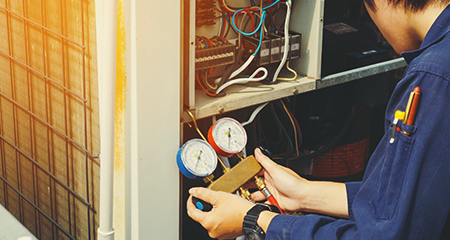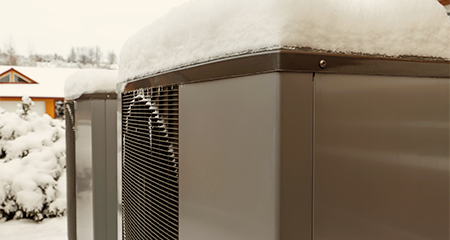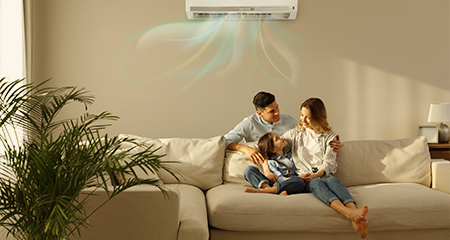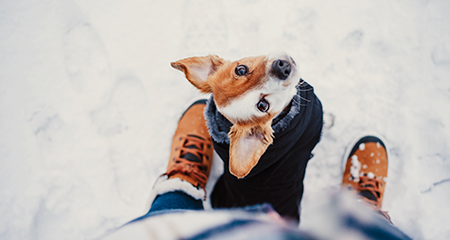1. Turn off the water supply.
The last thing you want is for your pipes to freeze during the winter. To prevent this, shut off the main water supply valve. Then, run all your taps inside and outside the home to empty the pipes. Consider blowing out the lines with an air compressor to ensure no water remains. If you have a sprinkler system, winterize that too.
Purchase some plumbing antifreeze and pour about a cup into every drain. The antifreeze will sit in the p-trap beneath the drain and protect it from any water remaining there that might freeze in the winter.
2. Drain and shut down the hot water tank.
If you have a conventional tank-style water heater, drain the tank. The last thing you want is for that water to freeze and crack the tank! Once you’ve drained the tank, turn the pilot light ‘off’ and close the gas supply valve.
Remember to fill the tank and turn the gas back on when you return in the spring. Depending on your hot water tank, you’ll likely have to relight the pilot light. Do not run the water heater until there is water in the tank.
3. Pump out the septic tank.
If your summer home uses a septic tank, have it pumped out before shutting down for the season. Though your septic tank is deep enough that it will unlikely freeze, pumping it out will give your tank a fresh start come spring. Don’t put any additives or antifreeze into your septic tank.
4. Deal with your heating system.
If you are not using the property during the winter, some will choose to turn off the heating system entirely. You won’t have to worry about frozen pipes if you've winterized the plumbing system. And some might feel the energy and cost savings is worth it.
However, fluctuating temperatures in Alberta winters can impact moisture levels in the house. If this concerns you, set your heating system to a reasonable temperature. That way, the temperature will remain consistent, and you’ll reduce moisture buildup during those freeze-thaw cycles.
5. Check carbon monoxide hazards.
If you’re running the heat while you’re away, you’ll have to check your HVAC vents and chimneys periodically for snow buildup. If no one can clear that snow while you’re away, install carbon monoxide detectors in the house. That way, whoever enters the home in the spring will be alerted if there is a danger of carbon monoxide.
6. Install a home security system.
It will be obvious if you’re away for months at a time. Unfortunately, criminals are on the hunt for vacant seasonal properties, and your home could be at risk. Depending on how remote your home is, it could be months before you even learn of a break-in!
The best way to protect your summer home from a break-in is with a home security system. That way, your home will be continually monitored, and you’ll be alerted if there is an issue. You can install security cameras to check in on your property throughout the winter.
7. Check your home insurance policy.
Accidents happen, and that’s why we have insurance! Every year, check your home insurance policy coverage and ensure the premiums are paid in full. If you discover an accident or damage in the spring, you want to ensure you’re covered.
8. Unplug appliances.
If you keep your electricity on in the house during the winter, unplug your appliances and electronics. Faulty electrical outlets or a power surge from a storm could cause a short and fire hazard. Turning off power to the property can also prevent this from happening.
9. Remove all food.
During winter, your summer home will look very inviting to little critters. Mice, squirrels, insects and other pests might make a home in your place while you’re away, and food will make your place all the more attractive! While preventing these little intruders is difficult while you’re away, removing food will help.
10. Make it look like someone is there.
If it is clearly a seasonal property, it will be obvious that the owners are away for the winter. However, you can at least make it look like the place is checked on regularly. For example, stop the mail so letters and flyers don’t pile up in the mailbox. Hire a snow removal company to plow the driveway so it looks lived-in. You can also install motion sensor exterior lights so it will look like someone could be home. If you have a neighbour who lives in the area year-round, ask them to check on the place regularly.
Owning a summer property has so many advantages and is a great investment. Protect that investment and lifestyle by properly maintaining and winterizing your property. It will also give you peace of mind knowing that your place will be ready for you to enjoy when spring arrives again!
If you have questions about running electricity and gas in your vacant property during the winter, reach out to us!

























